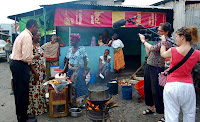Kiva Fellow Sarah Forbes recently facilitated a shoot in Tanzaniza for a BBC documentary series that includes Kiva. The shoot involved interviews with Kiva Entrepreneurs at Tujijenge. She wrote about her experience:

You can never quite be sure what requests you might receive as a Kiva Fellow, and the call I received from Kiva's Public Relations Director, Fiona Ramsey, was one of theose unexpected requests. She let me know that the BBC was putting together a television series on social enterprise, that one of the episodes will focus on Kiva, and that a BBC Rockhopper Production Team would be coming to Tanzania to film some Kiva Borrowers from our Field Partner Tujijenge. As a Kiva Fellow in Tanzania, I was in a position to help facilitate the filming.
In order to tell the complete story of Kiva, a BBC Rockhopper production team (consisting of Rebecca Stewart and Kim Dawson) and the series host (Alvin Hall) arrived in Tanzania after several long flights, ready to roll the next morning. Their time in Dar es Salaam was limited, as they had an appointment the next day to film giant rats. Yes, that’s right, giant rats. Kiva is in great company for this series on social enterprise, alongside the fascinating organization of Apopo, which breeds and trains giant rats to sniff out tuberculosis in blood samples as well as to track down landmines in Mozambique.
Since we would only have one day to get the film of Alvin Hall interviewing Kiva borrowers completed, and had to compete with giant, TB-sniffing rats, I was a bit nervous, especially since I only had 3 days in which to organize where they would be shooting and whom.

I shouldn’t have been nervous, though, since, luckily, Tujijenge has Rita as a Kiva Coordinator. Rita was indispensable to the work done both in preparation and in actual filming, helping to organize interviews so that we could identify potential stories, wandering with me down dark, muddy alleys in the rain in search of borrowers’ business locations, and acting as translator both during phone calls to borrowers and, when two other translators backed out, during the filming itself. This project simply would not have happened without her. Nor would Kiva be able to function without her and the other Field Partner staff like her all around the world.
The borrowers focused on in the episode are Neema Abdallah and Atuna Issa, two incredible women whose stories of entrepreneurship will be able to hold their own against those of even the most talented giant rat nostrils. Neema is a divorcee, mother of three, and on her second loan from Tujijenge. We met with her for filming at her second business, the pharmacy she opened using capital from her first Tujijenge/Kiva loan and has been able to expand with the funds from her second loan. She now not only has two businesses to support herself, but is also able to provide an employment opportunity for another.
Atuna is a single mother of one daughter and has been able, using the loan from Tujijenge/Kiva to change from a business of selling illegal home brewed alcohol to frying and selling breakfast cassava. She showed us how she is slowly expanding her business with the cooler that she purchased and stocked with cold drinks using loan money. Atuna told us that she feels relieved to have changed to a more stable business and is happy to be able to provide education for her daughter with her profits.

The actual shooting of footage turned out to be much more low key than I had imagined. Some people gathered around to find out who we were and why we were there with a big camera and a big, bushy microphone (some good, if somewhat bizarre, neighborhood publicity for Tujijenge), but other than needing to ask for some radios to be turned down, the filming went off without a hitch. In no time at all, it seemed, the BBC Rockhopper Team were on the road.
They returned again the next week, sans host Alvin, to get some additional footage of Atuna setting up her business in the early hours and of Neema attending her weekly borrower group meeting. Winnie Terry, the manager of Tujijenge, also provided a look at Kiva operations from the field partner’s point of view. Combined with footage shot at Kiva Headquarters in San Francisco, the BBC episode will enable viewers to see the complete picture of how Kiva loans get to borrowers, examples of how they affect borrowers’ lives, how the money gets back to lenders, and what, in short, all of this really means for everyone involved.

A few months from now, the BBC Rockhopper production team will return to Tanzania, to meet again with Neema and Atuna, and to find out how they and their businesses are faring. Have the loans had a positive impact on how they do business? On how the women lead their lives? The series (as yet unnamed) is due to air sometime in the spring of 2010, so keep on the lookout for it to find out!"
You can read the Rockhopper Production Blog for the BBC Social Enterpreneurship series here.